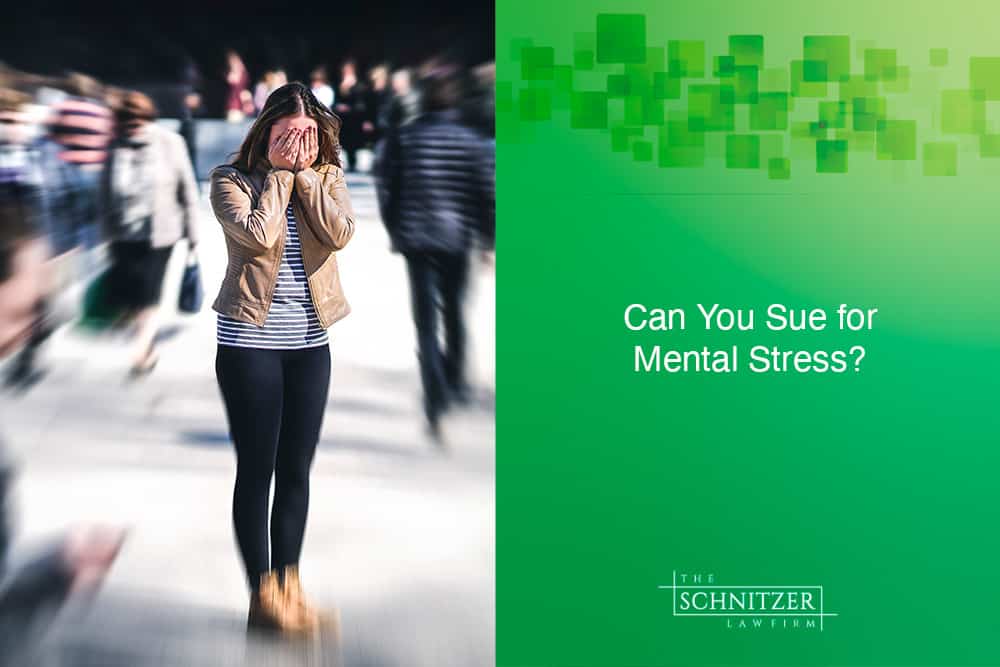What is the first thing that comes to mind when you think of a personal injury? In most cases, it is the physical pain and injuries resulting from the accident. However, there is another aspect that is often overlooked.
Many times, emotional trauma or distress are associated with those personal injuries. The trauma from a personal injury can alter the victim’s emotional state and cause mental stress. Find out whether the courts allow you to file a personal injury claim to seek damages related to mental distress.
Is Mental Stress a Personal Injury?
Yes. Mental illness is also a personal injury, and the claimant could be entitled to compensation. Emotional distress caused by a personal injury can often be more devastating than physical injury. Victims of personal injury trauma will respond differently to the incident. The severity of the accident, the victim’s physical condition, and the effects on the brain are common factors that determine the victim’s psychological damage.
Symptoms of mental stress can vary from person to person. Common symptoms of emotional distress associated with a traumatic injury include:
- Insomnia
- Nightmares
- Anxiety disorders
- Depression
- Suicidal thoughts
- Panic attacks
- Anger and mood swings
- Self-isolation
- Physical and mental fatigue
- Emotional detachment
Post-traumatic stress disorder, anxiety disorders, phobia, and depression are commonly seen in victims who have suffered a personal injury.
Can You Sue for Mental Stress?

Like personal injuries, mental stress and other psychological injuries can also be compensated. However, the problem is that emotional distress is not as apparent as physical pain and suffering, making the claims process very difficult to prove. The insurance company may claim that the victim exaggerated the injuries or that the accident was not as severe as stated in the lawsuit.
How do you file a lawsuit for mental stress? Filing a claim for psychological harm requires an experienced injury lawyer in Las Vegas who can assist the claimant in obtaining appropriate damages for personal injury or emotional distress.
In a legal sense, psychological injuries are considered non-economic damages in personal injury cases.
In some cases, the claimant can prove that the defendant intentionally caused the victim mental stress. In these proceedings, the victim should show that the act was offensive and caused the injury. The plaintiff must also demonstrate that the defendant knew these actions would cause emotional distress to them.
If the injury was caused by the defendant’s negligence, even unintentional, and resulted in severe emotional distress to the victim, the defendant may still be liable for the mental stress.
Proving Mental Stress in a Personal Injury Lawsuit
The claimant will need to demonstrate a few facts about the case, such as:
Physical Injuries

Physical injury to the victim is essential evidence of mental distress. In some rare cases, the victim does not need a bodily injury to support a claim for emotional distress. However, a victim should be ready to show evidence that they were physically harmed in an accident or as a result of the defendant’s actions.
Mental Health Records
A qualified physician can prepare a mental health report after assessing the victim’s emotional state. These medical documents related to the victim’s post-accident mental stress may reinforce the emotional distress claims. The information may also include records of counseling and psychological treatments that the claimant received following the injury.
Medical Reports
Medical reports are crucial to any personal injury case. This medical report serves as primary evidence that the victim received treatment for the injury. Without the proper documentation, there is no case. If there is an accident, always seek medical assistance and obtain a record of the treatments.
Witness Statements
There must be some evidence that the victim has experienced mental stress from a personal injury. Testimony from people who are close to the victim can be considered a piece of evidence in these cases. Friends and family members must accurately describe the plaintiff’s emotional state after the incident and provide testimony on how mental stress affected the victim’s life.
You can start the mental stress lawsuit process by contacting an attorney. There are many Las Vegas injury attorneys, but you need to choose someone who specializes in these cases.
Recovering Damages from Mental Stress

Claiming mental distress involves several steps. First, you must document the distress, and any changes in your mental health can be used as evidence in a personal injury case. After that, the victim needs to talk to an experienced attorney.
Mental stress recovery cases can be hard to win at trial. For that reason, you need the best injury lawyer in Las Vegas. The attorney will review the victim’s evidence and other documents before filing a lawsuit. At this stage, the lawyer can determine whether you have a case to sue for mental stress related to a personal injury.
Personal injury and mental stress occur in tandem and cannot be ignored. It is more challenging to prove mental distress than it is to win a case involving a physical injury. An experienced personal injury lawyer specializing in pursuing emotional distress claims can assist you in these personal injury cases. With their help, you may get compensation for the emotional anguish stemming from these injuries.
Reach Out To a Personal Injury Lawyer in Las Vegas
Legal counsel is essential in personal injury cases involving mental stress. For a free consultation, get in touch with the legal professionals at The Schnitzer Law Firm.
